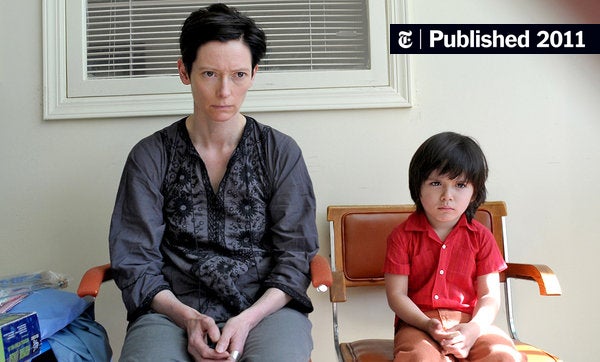Genre: Psychological Thriller | Drama | Family | Horror
We Need to Talk About Kevin is a film that burrows under your skin and lingers there long after the credits roll—an unsettling portrait of motherhood, guilt, and the chilling question of whether evil is born or made. Directed by Lynne Ramsay and adapted from Lionel Shriver’s acclaimed novel, this 2011 psychological thriller is a masterclass in tension, ambiguity, and dread.
The story centers on Eva Khatchadourian (Tilda Swinton, in one of her finest performances), a woman whose once vibrant life has been reduced to quiet misery after a horrifying tragedy. Through a fractured, non-linear narrative, the film drifts between Eva’s past and present, piecing together her life as a mother to Kevin (played chillingly by Ezra Miller as a teenager and Jasper Newell as a child).
From the beginning, Kevin is a difficult, unnerving child—withdrawn, cruel, and manipulative. He pushes Eva’s patience to the edge, waging a private war of wills against her while appearing angelic in front of his father (John C. Reilly), who refuses to see the boy’s darkness. As Kevin grows, his small acts of defiance evolve into something far more sinister, building toward a shocking act of violence that shatters the family and the community.
Ramsay’s direction is hypnotic and merciless. She crafts the film less like a straightforward thriller and more like a waking nightmare—jarring edits, saturated reds, disorienting sound design, and haunting imagery seep into every frame. The repeated motif of red—spilled paint, tomatoes, blood—becomes a visual reminder of guilt and stain that Eva can never wash away.
At its heart, the film is not just about Kevin’s monstrous act but about Eva’s suffocating isolation and self-torment. Did she fail as a mother? Did she sense the darkness too early and nurture it through her fear and resentment? Or was Kevin always destined to be what he became, no matter how she loved or failed him? Ramsay refuses to give easy answers, making the film all the more disturbing and thought-provoking.
Swinton’s performance anchors everything. Her haunted face, so often silent but alive with suppressed grief and horror, tells the story better than any line of dialogue could. She makes Eva both victim and possible accomplice, a woman who must carry the unbearable weight of giving birth to someone she cannot understand or save.
Ezra Miller is equally unforgettable—cold, taunting, and eerily intelligent, he embodies Kevin’s disturbing blend of childlike cruelty and calculated menace with terrifying precision.
We Need to Talk About Kevin is not a film for the faint of heart. It’s a bracing, unsettling exploration of parental fear, nature versus nurture, and the scars that tragedy leaves behind. More psychological horror than conventional drama, it stays with you like a dark echo—asking uncomfortable questions about love, responsibility, and the unknowable depths of those closest to us.
Over a decade later, Ramsay’s film remains one of the most striking and unsettling studies of evil and the hidden terrors of family life—a reminder that sometimes the monsters don’t come from outside the house. Sometimes, we raise them ourselves.



